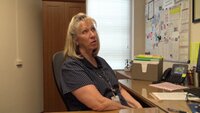| Title |
Holdaway, Ann OH19_060 |
| Creator |
Weber State University, Stewart Library: Oral History Program. |
| Contributors |
Holdaway, Ann, Interviewee; Storey, Sarah Interviewer; Baird, Reagan, Video Technician |
| Description |
The Beyond Suffrage Project was initiated to examine the impact women have had on northern Utah. Weber State University explored and documented women past and present who have influenced the history of the community, the development of education, and are bringing the area forward for the next generation. The project looked at how the 19th Amendment gave women a voice and representation, and was the catalyst for the way women became involved in the progress of the local area. The project examines the 50 years (1870-1920) before the amendment, the decades to follow and how women are making history today. |
| Abstract |
The following is an oral history interview with Ann Holdaway conducted on September 3, 2019 at Valley View Elementary School in Roy, Utah, by Sarah Storey. Ann discusses her life and the impact of the 19th Amendment. Reagan Baird, the video technician, is also present during this interview.; The following is a video clip from an oral history interview with Ann Holdaway, conducted on September 3, 2019. In this video clip, Ann discusses gender norms and how women contribute to the workforce. |
| Image Captions |
Ann Holdaway 3 September 2019; Ann Holdaway discussing gender norms and how women contribute to the workforce. |
| Subject |
Women's rights; Women in higher education; Education; Elementary school principals; Suffrage |
| Keywords |
Gender norms; Women in the workplace; 19th Amendment |
| Digital Publisher |
Stewart Library, Weber State University, Ogden, Utah, United States of America |
| Date |
2019 |
| Date Digital |
2019 |
| Temporal Coverage |
1960; 1961; 1962; 1963; 1964; 1965; 1966; 1967; 1968; 1969; 1970; 1971; 1972; 1973; 1974; 1975; 1976; 1977; 1978; 1979; 1980; 1981; 1982; 1983; 1984; 1985; 1986; 1987; 1988; 1989; 1990; 1991; 1992; 1993; 1994; 1995; 1996; 1997; 1998; 1999; 2000; 2001; 2002; 2003; 2004; 2005; 2006; 2007; 2008; 2009; 2010; 2011; 2012; 2013; 2014; 2015; 2016; 2017; 2018; 2019 |
| Medium |
oral histories (literary genre) |
| Spatial Coverage |
Ogden, Weber County, Utah, United States, http://sws.geonames.org/11788968, 41.22809, -111.96766; Sandy, Salt Lake, Utah, United States, http://sws.geonames.org/5781061, 40.59161, -111.8841; Salt Lake City, Salt Lake, Utah, United States, http://sws.geonames.org/5780993, 40.76078, -111.89105; Pleasant View, Weber, Utah, United States, http://sws.geonames.org/5779833, 41.31828, -111.99216 |
| Type |
Text; Image/StillImage; Image/MovingImage |
| Access Extent |
22 page PDF; Video clip is an mp4 file, 115 MB |
| Conversion Specifications |
Filmed using a Sony HDR-CX430V digital video camera. Sound was recorded with a Sony ECM-AW3(T) bluetooth microphone. Transcribed using Express Scribe Transcription Software Pro 6.10 Copyright NCH Software. |
| Language |
eng |
| Rights |
Materials may be used for non-profit and educational purposes, please credit University Archives; Weber State University; Music from Uppbeat (free for Creators!): https://uppbeat.io/t/yeti-music/gentle-breeze; License code: IWGKRYG7XHQOMZY0; Music from Uppbeat (free for Creators!): https://uppbeat.io/t/simon-folwar/hope; License code: KYI5VLB63GF1TXND |
| Source |
Holdaway, Ann OH19_060 Weber State University Archives |
| Format |
application/pdf; video/mp4 |
| ARK |
ark:/87278/s6bk4yxs |
| Setname |
wsu_bs_oh |
| ID |
105470 |
| Reference URL |
https://digital.weber.edu/ark:/87278/s6bk4yxs |
| Title |
Holdaway, Ann OH19_060 |
| Creator |
Weber State University, Stewart Library: Oral History Program. |
| Contributors |
Holdaway, Ann, Interviewee; Storey, Sarah Interviewer; Baird, Reagan, Video Technician |
| Description |
The Beyond Suffrage Project was initiated to examine the impact women have had on northern Utah. Weber State University explored and documented women past and present who have influenced the history of the community, the development of education, and are bringing the area forward for the next generation. The project looked at how the 19th Amendment gave women a voice and representation, and was the catalyst for the way women became involved in the progress of the local area. The project examines the 50 years (1870-1920) before the amendment, the decades to follow and how women are making history today. |
| Abstract |
The following is an oral history interview with Ann Holdaway conducted on September 3, 2019 at Valley View Elementary School in Roy, Utah, by Sarah Storey. Ann discusses her life and the impact of the 19th Amendment. Reagan Baird, the video technician, is also present during this interview. |
| Image Captions |
Ann Holdaway 3 September 2019 |
| Subject |
Women's rights; Women in higher education; Education; Elementary school principals; Suffrage |
| Keywords |
Gender norms; Women in the workplace; 19th Amendment |
| Digital Publisher |
Stewart Library, Weber State University, Ogden, Utah, United States of America |
| Date Digital |
2019 |
| Temporal Coverage |
1960; 1961; 1962; 1963; 1964; 1965; 1966; 1967; 1968; 1969; 1970; 1971; 1972; 1973; 1974; 1975; 1976; 1977; 1978; 1979; 1980; 1981; 1982; 1983; 1984; 1985; 1986; 1987; 1988; 1989; 1990; 1991; 1992; 1993; 1994; 1995; 1996; 1997; 1998; 1999; 2000; 2001; 2002; 2003; 2004; 2005; 2006; 2007; 2008; 2009; 2010; 2011; 2012; 2013; 2014; 2015; 2016; 2017; 2018; 2019 |
| Medium |
oral histories (literary genre) |
| Spatial Coverage |
Ogden, Weber County, Utah, United States, http://sws.geonames.org/11788968, 41.22809, -111.96766; Sandy, Salt Lake, Utah, United States, http://sws.geonames.org/5781061, 40.59161, -111.8841; Salt Lake City, Salt Lake, Utah, United States, http://sws.geonames.org/5780993, 40.76078, -111.89105; Pleasant View, Weber, Utah, United States, http://sws.geonames.org/5779833, 41.31828, -111.99216 |
| Type |
Text; Image/StillImage |
| Access Extent |
22 page PDF |
| Language |
eng |
| Rights |
Materials may be used for non-profit and educational purposes, please credit University Archives; Weber State University |
| Source |
Holdaway, Ann OH19_060 Weber State University Archives |
| Format |
application/pdf |
| Setname |
wsu_bs_oh |
| ID |
105629 |
| Reference URL |
https://digital.weber.edu/ark:/87278/s6bk4yxs/105629 |





